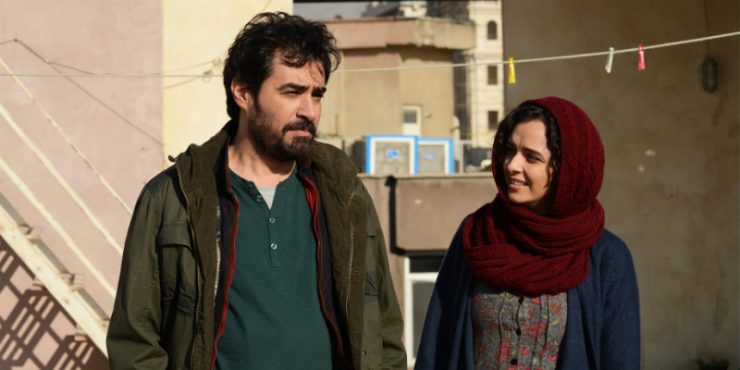Asghar Farhadi’s ability to so scrupulously dissect the nature of humanity is one of the best things one can see in a movie theater these days. 2012’s A Separation was a masterpiece of tension, a biting portrayal of middle class Iran and the results of small indiscretions leading into something more tragic. His latest film, The Salesman, follows a similar plot progression. It deals with a married couple who both happen to be playing the lead role in their rendition of Arthur Miller’s Death of a Salesman. The inclusion of Miller is an interesting one. Miller’s plays are bombastic and fatalist, and they attempted to portray the average citizen effected by a crushing society. He always had one foot in realism and another in the fantastic. I don’t know how much Farhadi admires Miller as a playwright, but there are definitely parrallels to be seen. The Salesman is a movie so profoundly about the inherent tragedy of the human race, it’d be hard to see how Miller himself could have cooked it up better.
Emad (Shahab Hosseini) is a school teacher by day, but his main passion is for acting. His wife, Rana (Taraneh Alidoosti), works alongside him. Childless, the two appear to live a bohemian life atypical to most in their Iranian town. The film opens as the apartment building they live in is near collapse, causing a panicked evacuation of all the residents inside. The damage is not as bad as they feared, but they still require a new apartment. A fellow player on Death of a Salesman named Babak (Babak Karimi) offers them a place to stay in a property that he owns. This new home will be temporary until they’re able to find something a bit more permanent. Babak neglects to mention that the previous tenant has left a good deal of her belongings in the apartment, and Emad later learns that the tenant was also a likely prostitute who caused all sorts of trouble both for the other residents in the building, as well as her varied clientele. Just as their play is set to open, Rana makes a mistake when she accidentally buzzes a stranger into the building thinking that it’s Emad coming from the grocery store. When Emad does comes home, he learns that Rana is in the hospital after a severe attack in their bathroom.
The ripple effect that the intruder has on Emad and Rana’s lives pulsates in their every action, even in their solemn silence. The play suffers, as Rana struggles to perform and their home life is riddled with unasked questions of guilt and culpability. The intruder leaves several pieces of incriminating evidence, including a stack of cash, a cell phone and a ring of keys. Emad finds the pick-up truck that the keys belong too and is ready to go to the police, but Rana refuses. She doesn’t wish to relive the horrible experience in front of strangers. She suffers but does not think retribution will bring her solace. Emad stands unconvinced, wishing for the chance to confront the attacker head-on. Their home life becomes more and more toxic with the stench of mistrust and fear, and Emad and Rana’s dealing with the emotional situation begins to stray further and further away from each other. As Emad’s manhunt becomes narrower, Rana worries about her husband’s taste for vengeance.
The Salesman borrows a lot from A Separation. Both films have such a comfortable, lived-in quality that only heightens the tension within the story. This is established by Farhadi’s sharp, hand-held style which manages to feel both real and skillful simultaneously. Farhadi is a testament to the fact that handheld camerawork does not need to lend itself to complacency. His framing and cutting are so on point and specific, so sure in their execution. This is a filmmaker with the utmost understanding of the complexities of his screenplay, and how to display that visually. There are so few films that have such an acute understanding of how the very mundane routines of life are what usually lead us to such harrowing circumstances. The performances of Hosseini and Alidoosti are the key here. Their portrayal of marital divide, and their interpretation of how the drama of the stage can rub off on the drama of your life (and vice versa) is what makes Farhadi’s thesis work. This is powerful, beautiful material, and these three artists perform tremendously together to make a fundamentally towering achievement. Like A Separation, The Salesman is a tragic document of the failing of humanity in the face of great turmoil.
We’ve learned over the weekend that Asghar Farhadi’s ability to attend the Oscars – where he’s nominated for directing The Salesman – is up in the air with the president’s heinous executive order forbidding entry of refugees and immigrants from a meticulously selected number of Middle Eastern countries. Farhadi’s home country Iran is one of those arbitrarily listed where entry into America is forbidden. Farhadi has also said that even if he is able to attend the Academy Awards, he has chosen not to; whether it be out of protest or to avoid inconvenience is not totally known. Trump’s order is immoral and will likely be found to be illegal, and that it’s indiscriminately prejudicial to the point of barring one of the world’s best dramatists is a sickening stain on the image of America and what it’s said to stand for. Farhadi’s films are essential, bringing to Western eyes the complexities of a culture that too many Westerners know so little of. Whether it be out of solidarity or out of basic cinematic interest, watching The Salesman (or his other masterpiece, A Separation) will only benefit the viewer with a new understanding he didn’t have previously. That this needs to be explained is another example of the sad state of affairs in America right now.
Written and Directed by Asghar Farhadi










